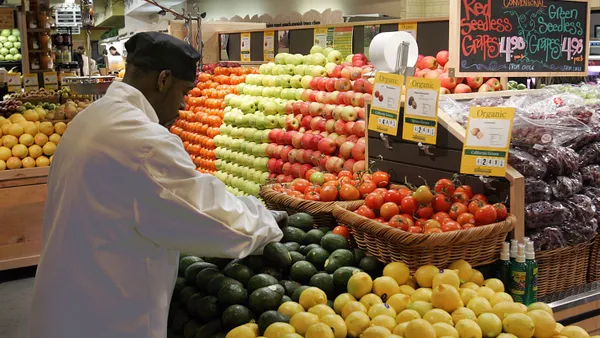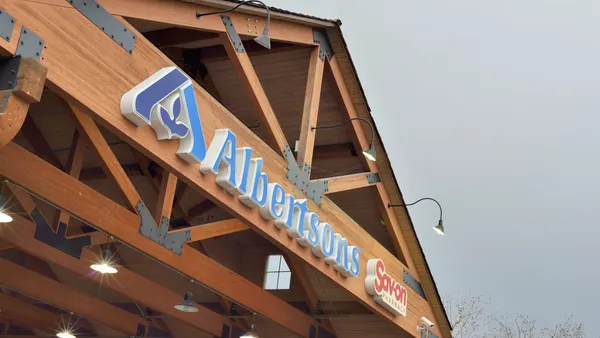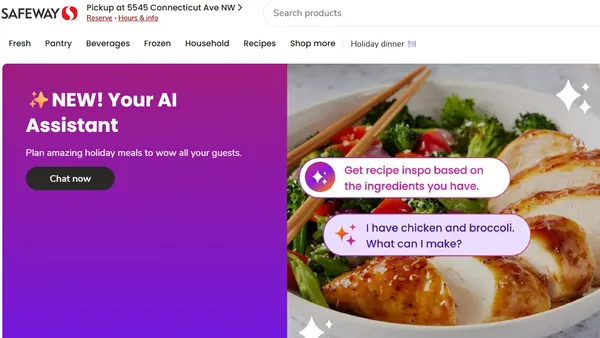Engaging customers at a personal level and helping them make the most of their time are now essential for any brand. Led by Amazon, companies are catering as never before to consumers' desires for speed, convenience, and personalized experiences. We consumers, in turn, have wasted no time in elevating our expectations of how easy, fast, and engaging—how frictionless—shopping ought to be.
Amid this landscape, brands and grocers are exploring new ways to take the friction out of their customers' experience. Payment is one obvious starting place. Online-based businesses use a variety of solutions to facilitate seamless payment, but retail has generally been slower to follow suit. So far, Walmart, Kroger, and Publix are among the grocery chains that have added or experimented with mobile payment capabilities in their stores.
Several chains have taken mobile payment a step further by letting customers scan items with their phones as they shop and then pay quickly in a dedicated checkout line.
But of course the ultimate in frictionless shopping is when you don't have to stop at all. We're increasingly seeing innovative examples of how grocers can make that fantasy a reality.
There's Amazon Go. There are promising-but-complicated experiments with camera networks and AI. And there's Ahold Delhaize's impressive "Lunchbox" concept, which combines cameras, sensors, and a proprietary phone app to enable customers to simply shop and go.
As groundbreaking and wow-worthy as some of these solutions are, they're focused on the in-store experience and are limited as a result. They do not provide back-end benefits, like improved inventory management and traceability. And most are still in the development stage. For an immediately deployable path to frictionless food shopping that also delivers huge advantages on the back end and supply chain, some companies are discovering the benefits of Radio-Frequency Identification (RFID) technology.
The most organized effort might be in Japan, where, as part of its broader initiative to make retailers more competitive through technology, Japan's Ministry of Economy, Trade and Industry has entered into an agreement with five of the country's largest convenience store companies to implement RFID by 2020. The goal? To automate shopping and at the same time improve inventory management and supply chain visibility.
Sodexo, one of the world's largest food service corporations, has successfully deployed RFID in SmartChef™, a grab-and-go concept for employees at one of its Singapore locations. SmartChef centers on a fully automated, self-service vending machine that provides hot entrees, healthy snacks, and beverages. Each item is tagged with RFID. Through the SmartChef app, consumers scan the machine's unique QR code to unlock the fridge and take what they want, and are billed automatically via their preferred mode of payment.
Byte Foods uses a similar arrangement as SmartChef RFID enabled products in the smart refrigerators it designs to supply healthy food options in offices, schools, hospitals, gyms and elsewhere. As with Sodexo's SmartChef, RFID tags on each beverage and food item give Byte up-to-the-minute visibility into what's in each of its fridges, as well as data on purchase history, expiry, and dynamic pricing capabilities. For both Byte and Sodexo, RFID removes friction from customers' experience, while helping the companies lower labor costs, reduce food waste, and better manage inventory.
Iris Nova's Drug Store has also created a particularly engaging, highly branded model of frictionless beverage buying. The compact space, opened in New York City's Tribeca neighborhood, stocks only one thing: Iris Nova's brand of health beverages. Customers walk in, open a cooler, grab the bottle they want, and send the company a text describing what they took. A display screen on the cooler serves up details about health benefits and other information about their drink. Payments are automatically debited via mobile payment, and the system automatically logs the inventory change at the store, while capturing customer data.
The secret? An unobtrusive, inexpensive RFID tag on every bottle that creates the bottle's digital twin or identity in Iris Nova's inventory system, enabling it to be tracked and traced across its lifetime.
"With RFID technology as a foundation, we have a lot of potential to make frictionless shopping a reality and engage even further with our customers," says Zak Normadin, Iris Nova's CEO.
The RFID tags on the beverages enable sales validation when the customer logs a purchase via SMS. They also provide unprecedented, atomic visibility into inventory, which results in far better stock management and knowledge of where any item is at any point in the supply chain. The tags allow automated monitoring of product expiration, better-informed analysis of sales trends, and ongoing, mobile-based encounters with customers that let shoppers discover the "who, what and where" of the beverage, take part in promotions and events, and learn about other Dirty Lemon products—as Dirty Lemon, in turn, learns more about the customer.
At Avery Dennison, we're partnering with customers like Iris Nova, Byte, and Sodexo to demonstrate how RFID can give grocery consumers a substantially barrier-free experience right now, while at the same time enabling huge supply chain and labor efficiencies. Based on use cases so far, there's good reason why many are betting on RFID as a critical ingredient in the digital transformation of retail shopping and food marketing. We're excited to show the world that the promise of RFID is fact, not friction.
Explore how RFID is making frictionless possible — Learn more.
Julie Vargas is Avery Dennison's global director of RFID market development for food.









